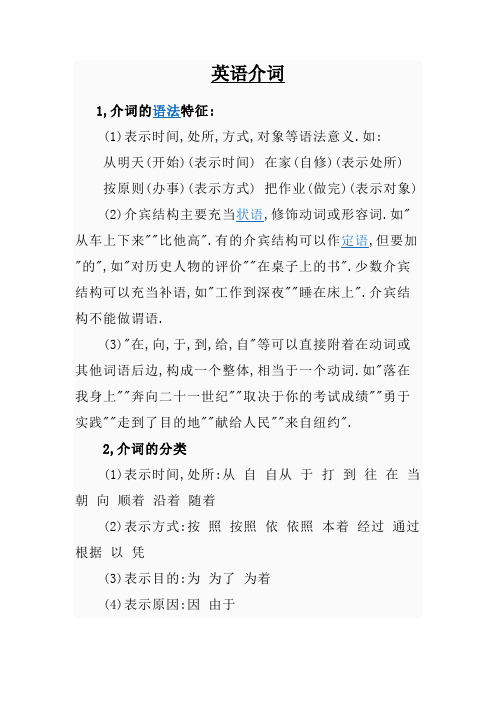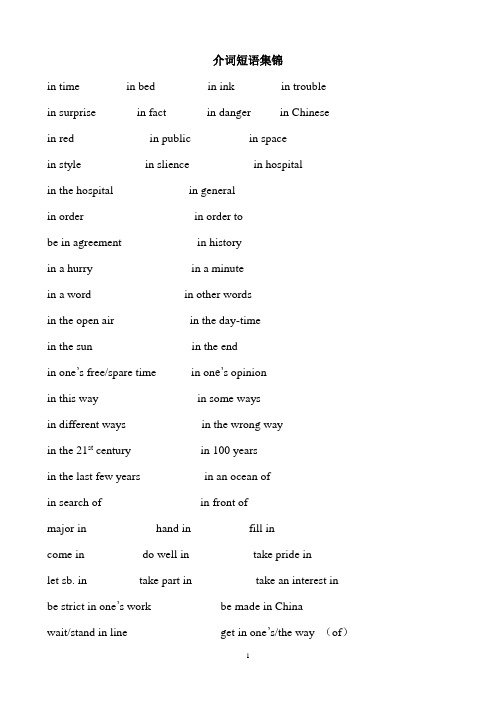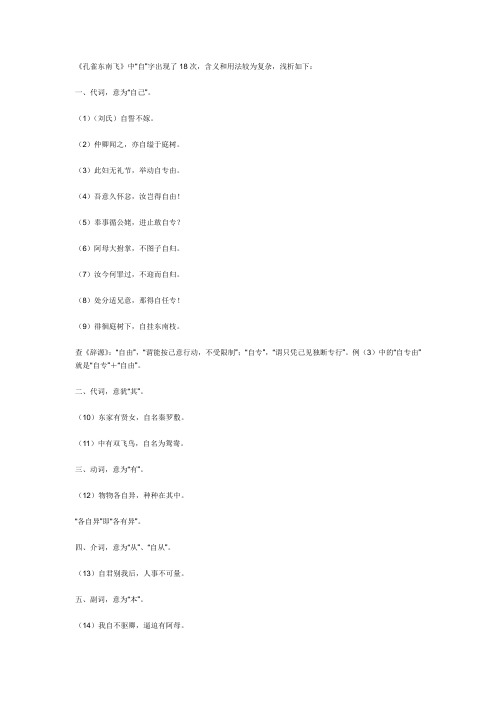自做介词
- 格式:ppt
- 大小:223.50 KB
- 文档页数:19

杜甫律诗“自”字论杨玉锋【摘要】Du Fu is very good at using the words,and his poetry is the excellent works in the Tang Dynasty. The word "zi" is used distinctively in his verses. Firstly,he used the word "zi" frequently, and what's more,he made the word zi filled with strong feelings. Secondly,Du Fu could develop the word's internal tension and exploit the word according to the specific situation,such as the speech and meaning,to attain a high achievement in duality. Thirdly,as for the grammar,DuFu could transgress the grammatical rules and made the word become the "eye" of the poem.%杜甫善于炼字,其律诗是唐代集大成的杰作,“自”字在杜甫律诗中使用极具特色:第一,作者运用“自”字的频率非常高,不仅如此,在使用“自”字时苦心构思,把自身的强烈感情贯注其中;第二,杜甫能够发挥“自”字的内在张力,针对诗歌创作的实际,根据词性和词意进行游刃有余地调配,在对偶方面到达了很高的造诣;第三,在语法上跳脱规则,让“自”字成为诗中的句眼,成为诗句的重点。
【期刊名称】《成都师范学院学报》【年(卷),期】2016(032)007【总页数】6页(P84-89)【关键词】杜甫;律诗;自;张力;词性;词义;语法【作者】杨玉锋【作者单位】浙江工业大学人文学院,杭州 310023【正文语种】中文【中图分类】I207.22律诗在唐代走向成熟,一般而言,相对于古体诗,律诗讲求诗句凝练,节奏更加严密,更注重以有限的词语创造出无穷的韵味,因此虚字运用得比较少,有的诗句可以完全不用虚字而句健意密,更有比较极端的看法认为“实字多则健,虚字多则弱”,“实一字则健一字,虚一字则弱一字”,因此“作诗需下实字”。

英语介词1,介词的语法特征:(1)表示时间,处所,方式,对象等语法意义.如:从明天(开始)(表示时间) 在家(自修)(表示处所)按原则(办事)(表示方式) 把作业(做完)(表示对象)(2)介宾结构主要充当状语,修饰动词或形容词.如"从车上下来""比他高".有的介宾结构可以作定语,但要加"的",如"对历史人物的评价""在桌子上的书".少数介宾结构可以充当补语,如"工作到深夜""睡在床上".介宾结构不能做谓语.(3)"在,向,于,到,给,自"等可以直接附着在动词或其他词语后边,构成一个整体,相当于一个动词.如"落在我身上""奔向二十一世纪""取决于你的考试成绩""勇于实践""走到了目的地""献给人民""来自纽约".2,介词的分类(1)表示时间,处所:从自自从于打到往在当朝向顺着沿着随着(2)表示方式:按照按照依依照本着经过通过根据以凭(3)表示目的:为为了为着(4)表示原因:因由于(5)表示对象,范围:对对于把向跟与同给关于(6)表示排除:除除了除去除非(7)表示被动:被叫让给(8)表示比较:比和同上述介词中的"着,了,过"是语素,不是动态助词.一、表示时间的介词:at:用于表示时刻,时间的某一点。
on:用于星期,某天,某一天的上午,下午,晚上(指具体的某一天时,一律用onin:用于表示周,月,季节,年,泛指上午,下午,晚上before:在...之前after:在...之后by:在....前(时间)截止(到)...until(till):直到.....为止for:达...之久(表示过了多少时间)during:在....期间through:一直..(从开始到结束)from:从...起(时间)since:自从...以来(表示从以前某时一直到现在仍在继续)in:过...后(未来时间)within:不超过...的范围二、表示场所,方向的介词:at :在某地点(表示比较狭窄的场所)in:在某地(表示比较宽敞的场所)on:在...上面,有接触面above:在...上方over:在...正上方,是under的反义词under:在..下面,在...之内below :在...下方(不一定是正下方)near:近的,不远的by:在...的旁边,比near的距离要近between:在两者之间among:在三者或者更多的之中around:环绕,在...的周围,在....的四周in front of:在...的前面behind:在...后边in:在..之内,用于表示静止的位置into:进入out of :和into一样,也表示有一定的运动方向along:沿着across:横过(平面物体)through:贯通,通过to :达到..地点(目的地)或方向for:表示目的,为了.....from:从...地点起三、其他介词with:和..在一起;具有,带有;用某种工具或方法in:表示用什么材料(例如:墨水,铅笔等)或用什么语言。

介词的分类
介词的分类有10个,这10个分类如下:
1.时间介词:表示时间或时序,例如“在、从、自、至”等,例如“在下午三
点”和“从明天起”。
2.数量介词:表示数量或程度,常与“有、超过、不足、比”等词语连用,例
如“有十个人”和“超过预算”。
3.范围介词:表示范围或限度,常与“在、于、至、距离”等词语连用,例如
“在这个区域内”和“于200米之外”。
4.目的介词:表示目的或目标,常与“为、向、为了、到”等词语连用,例如
“为了获得更好的成绩”和“向前看”。
5.比较介词:表示比较程度或比较对象,常与“像、与、跟、比”等词语连用,
例如“像他那样做”和“与其他公司相比”。
6.表示方式的介词:按、照、按照、依、依照、本着、经过、通过、根据、以
等,例如“按计划进行”和“依照指示操作”。
7.表示原因的介词:因、由于、因为等,例如“因为天气不好”。
8.表示对象的介词:对、对于、把、向、跟、与、同、给、关于等,例如“对
他表示感谢”和“对于这个问题给出解决方案”。
9.表示排除的介词:除、除了、除去、除非等,例如“除了你之外,我们都去
了。
”
10.表示被动语态的介词:被、叫、让、给、使等,例如“他被别人欺骗了。
”
1/ 1。

介词短语集锦in time in bed in ink in troublein surprise in fact in danger in Chinesein red in public in spacein style in slience in hospitalin the hospital in generalin order in order tobe in agreement in historyin a hurry in a minutein a word in other wordsin the open air in the day-timein the sun in the endin one’s free/spare time in on e’s opinionin this way in some waysin different ways in the wrong wayin the 21st century in 100 yearsin the last few years in an ocean ofin search of in front ofmajor in hand in fill income in do well in take pride inlet sb. in take part in take an interest in be strict in one’s work be made in Chinawait/stand in line get in one’s/the way (of)not…in the slightest in most recent timesspend some time (in)doing sth. have fun (in)doing sth. be/keep in good healthlook…up in a dictionaryon time on display/show on dutyon watch on earth on footon business on TV on computeron stage on vacation/holidayon the phone on the left on top ofon a farm on one hand on the other handon the radio on a space station on the other side of on each/either side of=on both sides ofon one’s sixth birthday on one’s way home/to schoolon a cold night on next day offbase on get on try…on work onput…on turn …on feed on go onoperater on spend some time/money ondecide on depend on pass…onconcentrate on plan on doing later onplay a joke on give advice onhold on to return to+地点thanks to be next to=be closed to prefer tolisten to point to/at write toget to add…to happen to sb.travel to welcome to belong tolead to dance to according tocome over to pay attention to help oneself to look forward to be similar to=take aftersay hello/sorry/goodbye to be off toso as toto one’s surprise to be honestGood luck to sb! Best wishes to sb!the key to the door the answer to the questionthe way to the park be important to sb.be angry/annoyed with be busy withbe pleased with be filled with=be full ofbe covered with be fed up withbe strict with agree withdo/deal with argue withhave a fight with talk with=communicate with play with help with compare…withstart with chat with/to make friends with get on well/badly with sb.provide sb. with sth.=provide sth. for sb.come up with= catch up withfall in love with sb. sing along withwith one’s help=with the help ofWhat’s wrong/the trouble with sb.?be made of be full of be afraid/terrified of be sure/confident of be proud ofbe careful of a set of a pair of skates a bit of a number/lot of plenty ofa piece/slice of all kinds of kind of=a little a balance of Yin and Yang hundreds ofbecause of first of all take care ofrun out of remind sb of sth. hear ofout of style It’s very kind/nice of you.a friend of mine keep out of the suninstead ofbe good/bad for be/get ready forbe late for be used forbe famous for make room forpay for leave for=go to look forsend for wait for thanks forask sb for sth.as for buy/draw…for go for a drive care for take sb. for a walk for everfor example/instance for a long time=for agesbe made from be different from 反the same asbe far (away)from stay away frombe across from learn fromcome from escape fromborrow…from hide sth. from sb.stop sb. from doing sth hear from sb. =get a letter from twenty years from nowlaugh at point at knock atlook at shout at at lastat first at least at mostat all at times=sometimes at onceat present= at the moment at that age at this time at the picnic at the meeting at the school gateat the same time be aimed atbe good at反be weak in be mad atat the age of at the end ofmix up stay up use up look upcut up grow up call…up end upwake…up clean up cheer up set upfix up put up think up show upopen up give up eat up dress uptalk about worry about care aboutbe worried about be serious aboutbe relaxed about think abouthow about hear aboutby the way by the timeby oneself by mistakeby accident by car=in a car one by one mean by go by drop by learn…by heart come byset off run off go offturn off take off put offhave…offturn down break down fall downpull down keep down jump downlet downhang out hand out= give out work output out go out be stressed outclean out take out跟ing 形式的动词、形容词、动词短语如下:enjoy/practise/finish/consider/allow/mind one’s doing sth.be busy/worth/against/used to doing sth.give up/put off /have fun/ have a hard time/spend some time/doing feel like/how about/look forward to doing sth.prefer doing sth. to doing sth.There be +n.+ doing sth.see/hear/notice/find sb. doing sth.跟to do的动词如下:want/hope/wish/volunteer/seem/need/ /pretend/ decide/ have an opportunity/used/attempt/volunteer one’s time/try(one’s best)/can’t wait/can’t afford/to do sth.be sure/be supposed/be surprised/be afraid/be hard/sorry/able/allowed to do sthwant/encourage/wish/tell /ask/lead/allow sb.to do sth.It takes sb. some time to do sth.It’s time to do sth.跟动词原形的短语如下:had better/why not/would you please/help/make plans do sth.would ratherdo sth. than do sth.make/let sb. do sth.系表结构的短语如下:look happy/smart/young/worried/terribled/comfortablesound interesting/good/wonderfulfeel well/lucky/sick/uncomfortablefall asleepget bored/angry/nervous/injured/annoyed/married/dressed/hurtseem possible/importantbecome famous/richkeep fitstay healthycome true。

汉语介词口诀
以下是一些汉语介词口诀,可以帮助你更好地理解和记忆介词的用法:
1- 自、从、以、当、为、按照,由于、对于、为了、到。
和、跟、把、比、在、关于。
除了、同、对、向、往、朝。
这些介词常常用在名词或代词前,组成介宾短语后,修饰或补充谓语动词或形容词。
2- "非学无以广才,非志无以成学",通过这句口诀可以记住"早、午、晚要用in,at黎明、午夜、点与分"等时间相关的介词用法。
3- 根据介词的性质和功能,可以归纳为几大类:表时间、处所、方向;表依据、方式、方法、工具、比较;表原因、目的等等。
例如,“自从”表示从过去某时开始一直延续到现在的情况;“为了”用来表明做某事的目的。

《孔雀东南飞》中“自”字出现了18次,含义和用法较为复杂,浅析如下:一、代词,意为“自己”。
(1)(刘氏)自誓不嫁。
(2)仲卿闻之,亦自缢于庭树。
(3)此妇无礼节,举动自专由。
(4)吾意久怀忿,汝岂得自由!(5)奉事循公姥,进止敢自专?(6)阿母大拊掌,不图子自归。
(7)汝今何罪过,不迎而自归。
(8)处分适兄意,那得自任专!(9)徘徊庭树下,自挂东南枝。
查《辞源》:“自由”,“谓能按己意行动,不受限制”;“自专”,“谓只凭己见独断专行”。
例(3)中的“自专由”就是“自专”+“自由”。
二、代词,意犹“其”。
(10)东家有贤女,自名秦罗敷。
(11)中有双飞鸟,自名为鸳鸯。
三、动词,意为“有”。
(12)物物各自异,种种在其中。
“各自异”即“各有异”。
四、介词,意为“从”、“自从”。
(13)自君别我后,人事不可量。
五、副词,意为“本”。
(14)我自不驱卿,逼迫有阿母。
六、副词,意为“已”、“已经”。
(15)本自无教训,兼愧贵家子。
七、副词,意为“即”。
(16)自可断来信,徐徐更谓之。
八、连词,意犹“而”。
(17)妾有绣腰襦,葳蕤自生光。
九、助词。
(18)勤心养公姥,好自相扶将。
“好自”即“好好地”。
“相”字出现的频率极高,量化统计可知,它共出现了十七次。
理解好如此之多的“相”字,不仅有助于同学们较全面地掌握它的多个含义,也有利于对文句的准确把握。
鉴此,笔者对其做了分类梳理,下面结合例句加以具体解释。
一、读xiāng,其词性有如下两类:第一类,作副词,表示彼此对待的关系,译为“互相、相互”,如:①贱妾留空房,相见常日稀②黄泉下相见,勿违今日言③枝枝相覆盖,叶叶相交通④仰头相向鸣,夜夜达五更从意思上看,①②的“相见”显然涉及夫妻双方,因而当是互相见面。
③中“相覆盖”的是“枝枝”,“相交通”的是“叶叶”,④中“相向鸣”的是“双飞鸟”,它们都涉及多方或双方的行为,因而“相覆盖”译为相互覆盖,“相交通”译为互相交接,“相向鸣”就是面对面哀鸣。
文言文介词的用法及例句引言:文言文是中国古代的文学遗产,研究文言文不仅有助于深入了解中国古代社会和人文历史,还能提升语言能力。
而介词作为一类常用的虚词,在文言文中也有其独特的用法。
本文将探讨文言文中介词的用法,并给出一些例句进行说明。
一、介词在修饰动宾关系中的应用1.向:表示动作的目标或方向例:低头向地下看。
2.以:表示手段、工具或材料例:以笔塑象。
3.自:表示起点、来源或原因例:读书自己聪明。
4.为:表示目的、意义或结果例:谋贫为财。
5.由:表示行动发出者或过程起点例:由山涧来,到家后先问母亲好。
6.因:表示理由和原因例:因风吹节,舟上之人无不肃然起敬。
7.与:表示同伴关系或并列关系例:与老师礼尚往来。
二、介词在时间和空间表达中的应用1.于/於/乎/夫/戏(谐音于)表示在、在于、基于例:固然,并非于岁月之风,于巅峰之刻,乃至堕落生命,依旧可倚吟亦可寄情,可观也。
2.从/自:表示起点出发或来源例:归来自故乡,他难捧我欢乐家声;从前文再看此词的源头。
3.向/趋:表示方向或趋势例:一去无顶天括地,直指万里青的心怀。
4.至:表示终点、时间或程度例:入手不曾及高山壁立无永别;又行遍四大洲追寻至创作目标。
5.为/与/和/共:表示陪伴、共同做某事或关系例:父母与子女共度时光,天下最美好的无尽定律。
6.以:表达手段、工具或材料例:以心为镜, 不负使命, 梦灯中人等世情谜语谶言宏法示真。
三、介词与动词搭配的应用1.待(dài):表示等待、处理或对待例:犹则待岗工资却未停止支取。
又如待废墟质上藏袭击者塔尔,勾坦兵主意名曰报复,迁移榕城。
2.为(wèi):表示担任、扮演或代表例:而全球名词“策展人”的角色为其内心深处的行动必用之媒。
3.依(yī):表示依靠、遵循或照顾例:即然然白日遽暴惧陋巷无门,不见来者应依次中断递减,形式外把依法办事。
4.赴(fù):表示前往、参加或投入某事例:此间并未多么乎奇异,“向南赴向北,东赴西就”方让以继续提供较好天气状况与物理因素powd+hq云+ tz通地+ew结语:本文详细介绍了文言文中介词的用法及相应的例句。
一、介词to的常见用法1. 动词 toadjust to适应 attend to处理;照料agree to赞同 amount to加起来达…belong to属于 come to达到drink to为…干杯 get to到达happen to发生在某人身上 hold to紧握lead to通向 listen to听,occur to想起 object to反对,point to指向 respond to回答,refer to参考;指的是…;涉及 reply to回答,see to负责 stick to坚持,turn to求助2. 动词( sth.) to sb.announce to通知某人 describe to向某人描述explain to向某人解释 express to对某人表达mention to提及 nod to向某人点头report to报告 say to告知hout to对某人大叫 suggest to提建议speak to与某人交谈 talk to跟某人谈话whisper to和某人低声耳语3. 动词 sth./sb. to sth./sb.add to增加 compare to比作carry to运送至 devote to致力于introduce to介绍给 invite to邀请参加join to连接到 leave to委托给reduce to下降至 sentence to判处take to带到4. be 形容词/过去分词 tobe alive to觉察;晓得 be attentive to注意;留心be awake to知晓 be blind to缺乏眼光be close to紧挨着 be common to对...很普通be contrary to违反;反对 be devoted to致力be deaf to不愿意听 be equal to有…的力量be exposed to暴露;遭受 be fair to对…公平be familiar to对某人来说熟悉 be grateful to对...心存感激be good to对…有好处 be harmful to对…有危害be important to对…重要 be kind to友好对待be known to周知于 be married to嫁给be moved to转移到 be near to靠近be necessary to对…有必要 be opposite to在对面be opposed to反对 be pleasant to合某人之意be proper to专属 be polite to礼貌待人be rude to粗暴对待 be relative to与…有关be strange to不习惯 be similar to类似be suitable to适合 be true to忠实be thankful to感激 be useful to对…有用be used to习惯5. to 名词构成的词组to a degree在某种程度上 to date到现在为止to one’s feet跳起来 to one’s mind照…看来to one’s surprise使…吃惊 to one’s taste符合胃口to oneself独自享用 to order定做to the letter不折不扣地 qto the point中肯地二、at的常见用法1. 动词 atarrive at抵达 call at访问某地catch at(it)当场抓住 come at攻击fire at向…开火 glance at瞟一眼glare at怒目而视 grieve at忧伤knock at敲 laugh at嘲笑look at看一眼 pull at拉扯rejoice at对…高兴 smile at向某人微笑shoot at朝…射击 stare at怒目而视thrust at刺向 tear at撕tremble at颤抖 wonder at吃惊work at工作2. be 形容词/过去分词 atbe angry at恼怒于 be alarmed at对…保持警觉be astonished at对…吃惊 be bad at不擅长be clever at对某事很灵巧 be delighted at高兴be disgusted at厌恶 be disappointed at对…失望be good at擅长 be impatient at对…不够耐心be mad at狂热于 be pleased at对…感到高兴be present at出席 be satisfied at满意be surprised at吃惊 be shocked at对…非常震惊be terrified at受到…的恐吓 be quick at对…很机敏3.at 名词构成的词组at a distance在一定距离 at a loss不知所措at a time一次 at all一点也不at any cost不惜一切代价 at best最好也只是at first起初 at hand手头at heart在内心里 at home在家;无拘束at last最后 at least至少at most最多 at once马上at present目前。
语文介词用法口诀
口诀:
自、从、以、当、为、按照,
由于、对于、为了、到
和、跟、把、比、在、关于
除了、同、对、向、往、朝。
用法:用在名词、代词前,组成介宾短语后,修饰、补充“动”“形”要记牢。
说明:介绍的分类不同专家有不同的分法,但大都大同小异。
参看另一种分法①施受介词
施受介词用于引出施事者或受事者。
施受介词主要包括:
把被叫让给由将归管
例如:
一道闪电把整个窗户都照亮了。
(引出受事)
她双脚跳起把流氓臭骂了一通。
(引出受事)
政府还给我们募集了一百件棉袄,二百条棉裤。
(引出受事)
②方式介词
方式介词用于引出动作的方式、方法、工具等。
方式介词主要包括:用以凭靠按据拿按照遵照依照根据通过本着例如:
我们的生活要靠劳动,不能单靠政府救济。
他常以一种欣赏的心态看着孩子们做游戏。